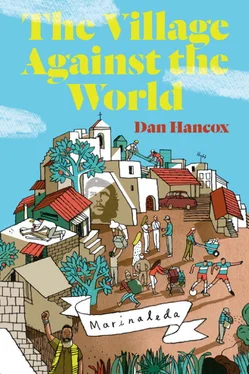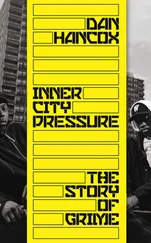It was clearly going to take some time to recover from the brutality – indeed, the sheer abnormality of living in a fascist dictatorship for three decades after the end of World War Two. To make matters worse, Franco had also left the Spanish economy in a terrible mess. The south was particularly hard-hit. The little capital raised in Andalusia from farming, mining or fishing invariably ended up invested or hoarded elsewhere in the country, amid chronic underinvestment. Dictators do not have to worry about regions falling massively behind, especially when the citizens of those regions were on the wrong side in a civil war and had a history of anarchism and anticlericalism.
‘The famous centres of Francoist development were demagogic castles’, wrote the authors of Huelga de Hambre , ‘created to fill the pages of newspapers – and the pockets of a handful of speculators and political junkies of the regime.’ Andalusia was left lamentably under-developed. The land was mostly idle, industry was almost non-existent, and there were severe shortages of teachers and school places and high levels of illiteracy. It was only the new tourist developments on the Costa del Sol which offered any work in the construction industry – and even then, the profits rarely stayed in the region. The poverty in rural areas was so dire that, as late as the 1970s, children would frequently have to abandon their schooling to work in the fields, when there was work, or migrate with their parents to find seasonal work in other parts of Spain. There had been una riada humana , a human flood, away from the pueblos . So bad had the farming situation become that 3 million Andalusians emigrated in the 1960s.
Juan Manuel Sánchez Gordillo was born in Marinaleda in February 1949 and was still in his mid-twenties when the struggle began. ‘When I was growing up,’ he told me, ‘it was a village of migrants. They would go to Germany or France; or for two months a year to the wheat fields in the north to look for work. Otherwise they were unemployed. There was utter destitution. The surroundings were all huge expanses of private land. Next to what is now the highway there’s the land of a Marquis. Then on the way to Seville there are other cortijos belonging to the Duchess of Alba.’ These are the latifundios , the mega-estates.
The land itself, Sánchez Gordillo wrote in his 1980 book, Marinaleda: Andaluces, levantaos , is the centre of gravity in Andalusia, for ‘it is on the land that the future will be built’. He was fond of comparing the situation of Andalusian peasant towns to that of Native American reservations, where native tribes driven from the plains where once they dwelt and worked are contained in miserable isolation, surrounded by the land which belongs to them – producing and reproducing poverty, humiliation and cultural degradation. He records one fellow marinaleño approaching him ‘crying like a child’ in the late 1970s and telling him: ‘Juan Manuel, I’m not a beggar. I want a job, because I am fifty-four and ashamed to be anywhere else than working in the fields’.
The demonstrations had begun before Franco died, as the increasingly desperate people of the south gained confidence – confidence in the absence of any hope of change from above. The familiar Andalusian dialectic of rebellion and repression intensified in the early 1970s, with huge construction industry demonstrations in Granada and strikes – which were still illegal – throughout the middle period of the decade, as well as sporadic crop burnings on the nobles’ estates. The Guardia Civil continued to exert the violence they had used in the nineteenth century and during the Civil War, and there were a number of deaths on demonstrations. For the impoverished Andalusian jornaleros , the death of el Generalísimo , though it did not itself guarantee the liberal democracy that would eventually follow – the first free general election was in 1977 – was a clear opportunity to raise the game. It was a classic crisis-opportunity.
As the tensions of the constitutional Transition proceeded, Marinaleda began working on, and towards, its own definition of freedom. Before the land seizures, before the collective farm, before economic democracy, before the virtually free housing, before the assassination attempts, before the supermarket raids, before utopia – came organisation. The rage of the strikes and demonstrations of the 1970s was bundled into the foundations of a movement. In 1976 the field workers’ union, the Sindicato de Obreros del Campo (SOC) was founded, and soon after the Marinaleda chapter formed in the garden of what is now Avenida de la Libertad. It was to be a union for day labourers, focusing on direct action, with a broadly anarchist philosophy. It was designed to be responsive to the precarity of the Andalusian peasant existence. At that time, Spanish union law prohibited voting in union elections until you had worked for the same employer for more than six months – ruling out 98 per cent of the 500,000 Andalusian field workers, severing an entire class from labour organisation.
On 4 December 1977 young Caparros was martyred, and the following January, the SOC began occupying the land. Early the following year, SOC’s Marinaleda chapter occupied a farm twenty miles away, near Osuna, for two days – the first time they had done so since the Second Republic. It ended when they were violently evicted by the Guardia Civil and several union leaders were jailed.
Meanwhile in Madrid, a new democratic Constitution had been written. In Marinaleda they held a general assembly to discuss it, and an official position was decided on: they would abstain from voting in the referendum to approve the Constitution. Most of the pueblo were already involved in the occupations and strikes, and wished to continue focusing their democratic energies that way. (They have maintained this ambivalence: in the context of the current Spanish crisis, I have heard the Constitution described in Marinaleda as a ‘pact with the residues of Francoism’. In their propaganda, it is accused of being ‘useless in stopping the markets’ war against the people’.)
They had chosen to ignore the new developments in Madrid, but Madrid had nonetheless noticed them. The Andalusian workers worried the Spanish bourgeoisie, a class largely composed of Francoists surreptitiously changing out of their uniforms. With some alarm, the Madrid newspapers quoted one of SOC’s founders as claiming that ‘the labourers, in essence, are anarchists at heart’. Suddenly, without the sanctions of Franco’s dictatorship to protect landed interests, the labourers’ union embodied a cathartic release of long-suppressed tension. Its philosophy was both radical and apparently disinterested in Soviet or Leninist dogma.
From the outset the marinaleños ‘declared the sovereignty of food’, as Sánchez Gordillo explained it to me, asserting that ‘food was a right and not a business; that agriculture should be out of the World Trade Organisation; that natural resources should be at the service of the communities that work them, and who use them’. While he has long expressed global solidarity for any marginalised community, and a corollary hatred of Western imperialism and militarism, it is the local needs of the pueblo that matter most. From the outset, sovereignty of the crops, and sovereignty of the terrain to grow them in, was the central tenet of the Marinaleda philosophy. Land, went the slogan, is a gift of nature, like air or water.
Then as now, Sánchez Gordillo had a gift for making the revolutionary sound like basic common sense. ‘Property’, he wrote in Andaluces, levantaos , ‘has no reason to exist when not serving a social purpose. To abolish property is not radicalism when that property produces hunger and scarcity for so many.’
Читать дальше












